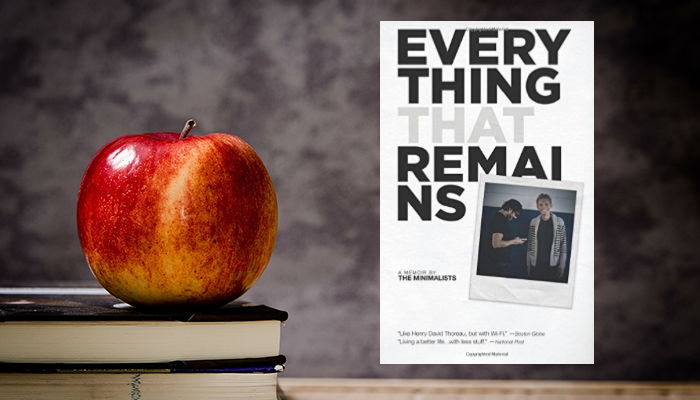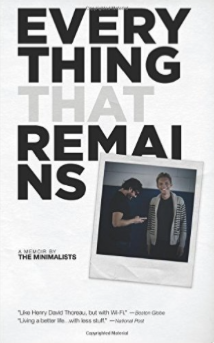Simplification. What's Important? : "Everything That Remains" by the Minimalists
So in my search for stories on minimalistic life changes, I came across the Minimalists. We got to see Joshua Fields Millburn (one of the Minimalists) on his recent Word Tasting Tour and it inspired me to pick up his memoir, Everything That Remains, from the library.


I've never been a hoarder. When you move throughout your childhood - living in 3 different houses in high school alone - you learn it's easier to not have a lot of stuff. I moved from Washington DC to Seattle WA with 5 50-lb suitcases. But from Seattle to Tucson I had more. And then from my apartment to my home, even more. And then when my husband moved in, even more.
As adults, we accumulate. Furniture. Kitchen supplies. Extras for guests. We finally have money to spend and we spend it. Work clothes. Books. Electronics. And soon we have homes full of stuff. Perhaps well organized stuff but still full of stuff.
It bothers me when things aren't put away. It irks me when surfaces aren't clean or there is clutter or dust or piles of things to deal with later. For years I would try to ignore the mess and do massive whole day cleanings when needed. You know the joke about someone scheduling an event at their home just so they will clean it. That was me. I hated it. HATED it. I do not like cleaning. I get no joy from the process.
But I really like when things are clean. I smile when I walk into a room that is organized and tidy (I know I have issues). Society today would probably tell me there is an easy solution. Hire someone to clean. I work 40+ hours a week and commute 1+ hours a day. I go to the gym daily and cook all our meals from scratch. I already do so much...so I deserve it right?
Now don't get me wrong, hiring a cleaning service is 100% awesome for some. My mother cleaned homes (not just our own) growing up and now she employees someone to deep clean her house once a month. Good for her. But it never felt right for me. Even before we decided to retire early and save 70% of our take home pay, it just didn't feel good to spend my money on paying someone to do something so easy.
So I've figured it out. Have less stuff to deal with. Simple right? Even better is to also have less space to have to clean as well (that will come when we retire). The other solution is to clean a bit everyday. I have a chores list for myself and my husband and do a 10 minute chore every night before going to bed. End result is that the house is always pretty clean (clean enough to keep me happy) and our weekends aren't spent cleaning and putting things away instead of doing the things we love.
This concept has seriously changed my life and we're slowly getting rid of the many things we don't need to make room for doing more of the things we love to do. In this journey towards minimalism (which is essentially what I just described) I have found that reading about others going through this process helps me stay motivated and check-in on my progress. This is why Steve and I love our Early Retirement / Financial Independence community. Hearing the stories of like-minded people keep us going when things get hard.
So in my search for stories on minimalistic life changes, I came across the Minimalists. We got to see Joshua Fields Millburn (one of the Minimalists) on his recent Word Tasting Tour and it inspired me to pick up his memoir, Everything That Remains, from the library. Joshua tells the story of his life from an unhappy married high-earning career man to a happy single minimalist through his mother's death, the end of his marriage, the loss of his career and more. There were some real gems scattered throughout the story that resonated with me. Particularly that "the things you own end up owning you." Which I have already come to realize and am starting to remedy.
This quote should sound familiar to the ER/FI community. "Now, before I spend money I ask myself one question: Is this worth my freedom?" Joshua came at FI from a minimalism perspective. I'm coming at minimalism from an FI mindset but truly these two concepts go hand in hand. The goals of FI & Minimalism are that we have the freedom (from debts or things) to live the lives we want to live. How do we pay down our debts? We save more money which means buying less stuff. When we buy less stuff we have less stuff to deal with and therefore have more time to live how we want. It all works out.
If you too like to read about other's changing their lives for the better and becoming inspirations for those of us striving to live as our authentic selves, then you might enjoy Everything That Remains. It's a nice story of how two men changed their lives to be more simple and more in line with what they wanted. Who wouldn't want that?